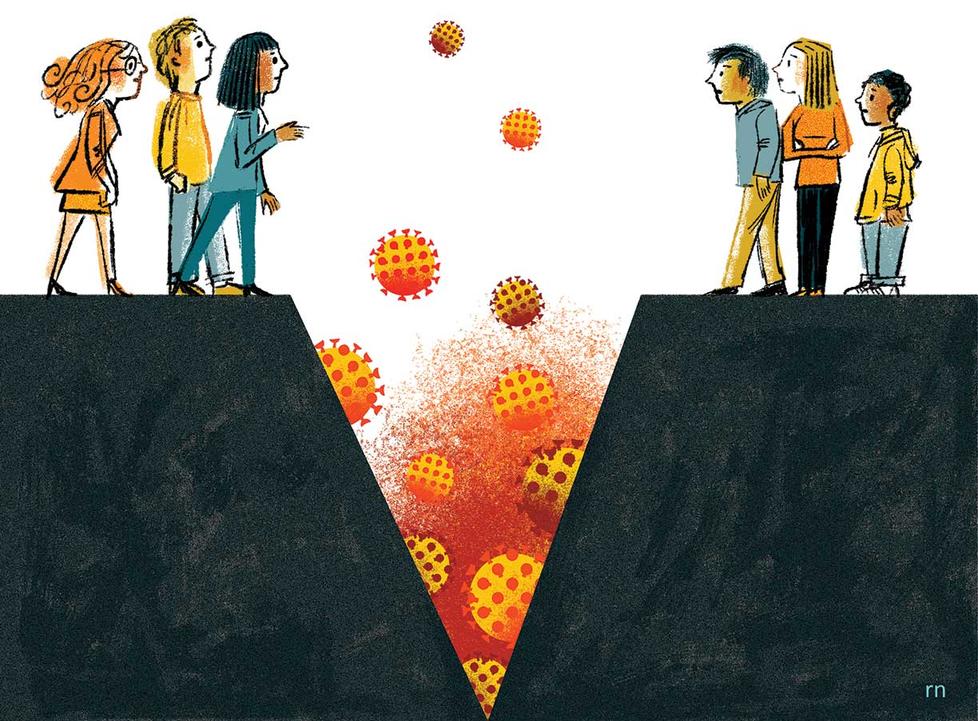Bridging Gaps in Institutional Memory
Traditions are changing after a yearlong pause in many parts of campus life

Acting is a rite of passage for members of the Princeton fencing team. “Every year we used to do a freshman play where the sophomores would write up a skit and the freshmen would have to act it out,” said Cameron Levy ’22, one of four co-captains. The skit is usually set on a crazy night out or a night before a final, packed with inside jokes to highlight the different team personalities.
But this year, the sophomores had no experience to draw on; they had missed the tradition last year, when winter sports were canceled and students took courses remotely in the fall semester. Juniors and seniors will be helping to fill in the gaps, Levy said, but now it is “a completely different dynamic.”
The change might seem trivial, but it’s part of a trend for undergrads whose time at Princeton has been disrupted by the pandemic: Traditions are changing after a yearlong pause in many parts of campus life.
At the Princeton Quadrangle Club, every night out used to end with students forming a big circle on the dance floor to sing “Piano Man.” At Butler-First dining hall, the end of every school year would include an “orange apron” ceremony, where student employees would come together to sign aprons for graduating seniors. Returning from the lockdown, the sophomores-turned-seniors are struggling to revive customs like these — many of which they haven’t experienced themselves — alongside three different classes that have never experienced a full year on campus.
“In the past, the shared experience of working in the dining hall and the dish room was enough to maintain the social fabric,” said Dee Mainali ’22, student coordinator at Butler-First dining hall. Student workers returned to dining hall jobs this fall, but there has been a staffing shortage with relatively few students remaining to train and recruit new employees. Everyday rituals, like grabbing ice cream at the end of a shift and sitting together to chat, have lapsed with the new student crew. “It’s not because we’re not comfortable with each other, but there are very few students who were here for that,” Mainali said.
Changes are evident in the residential colleges, too, since most of the students who could pass on traditions — juniors and seniors — no longer live in the colleges. According to Angie Sheehan ’22, a residential college adviser at First College, this physical separation is adding to the generational divide between the classes that entered Princeton before COVID and those that entered during the pandemic.
“Late-night cookies and coffee at Wilcox used to be very popular my freshman and sophomore years,” Sheehan said. “This year, I was trying to help start it back, but people don’t really know about it, and seniors who might know these things have moved on to eating clubs.”
Upperclassmen across campus echoed a feeling of disconnection from the freshmen and sophomores. Zeytun West ’22 sees it in the Triple 8 dance company, where she’s the assistant artistic director. “My sophomore year, I was able to observe and absorb the different traditions by just being present,” West said. For current juniors, who were freshmen when the spring 2020 semester was interrupted by COVID, or members who joined the group during the virtual semester last fall, learning the ropes hasn’t come as naturally.
But the gap presents an opportunity to revisit outdated customs and introduce new traditions to bond the four current classes of Princetonians. On Prospect Avenue, for example, Cap and Gown Club instituted a formal diversity, equity, and inclusion workshop before bicker to make the process more accessible.
Levy said the fencing captains have “a lot more agency to decide what traditions we want to continue as well as to push new initiatives forward.” The team has updated its group bonding events with substance-free activities, including a game that involves standing on one leg and trying to eat a cupcake off the floor without using your hands.
“Sometimes there’s a little pushback from the upperclassmen that went through something different,” Levy said, “but for the team as a whole, everyone’s just excited to be back and doing new things together.”











0 Responses